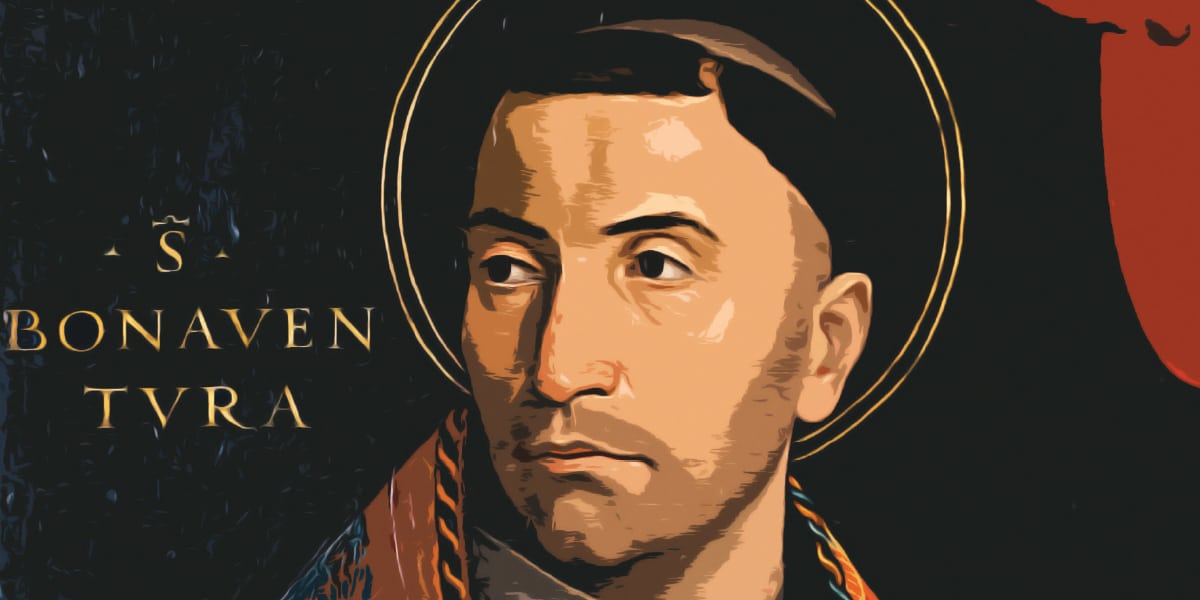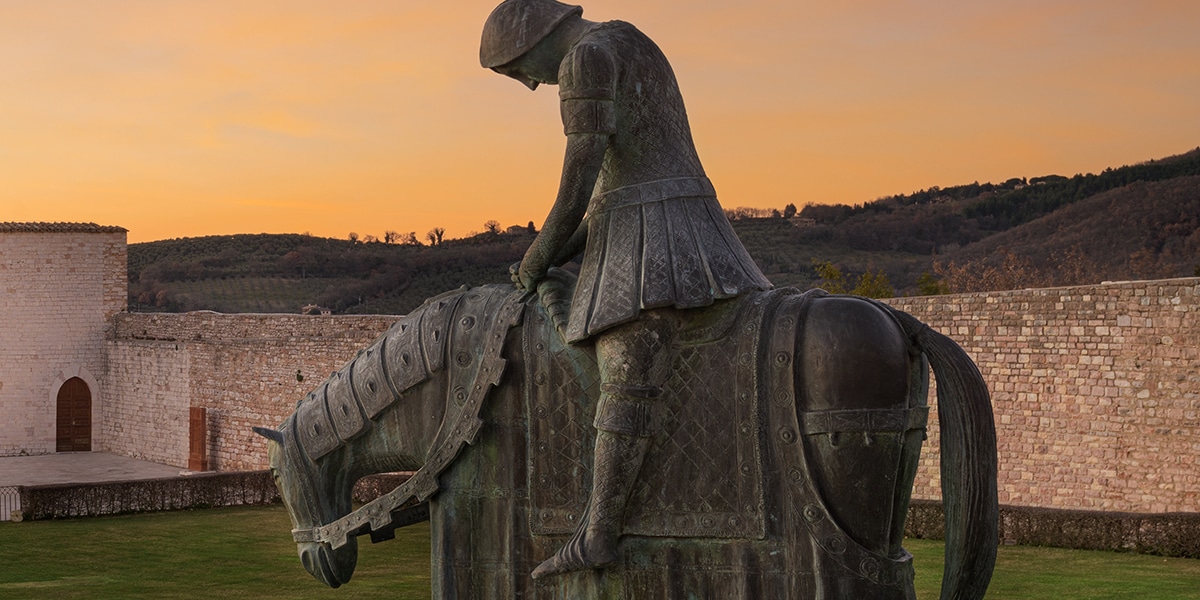The life and message of St. Bonaventure can provide a framework for understanding both the world and your personal calling.
When did “God” become more than a word to you? When, even for just a moment, did you glimpse the meaning of your life and personal vocation? When, in the midst of the challenges and complexities of adult responsibilities, did you regain the joy and passion you felt as a child? Or, in a time of trouble, struggling to find your way, how did God’s amazing grace become real to you and, though the path remained difficult, you knew that God was with you and trusted that you would find your true home? Perhaps it was the birth of your child or grandchild, a starry night in the Rockies, a sunrise at the beach, a time when you hit rock bottom and discovered the Rock, your child received a cancer diagnosis, or you felt Christ come alive in the bread and wine.
At such moments, we are forever changed. Despite our imperfections and struggles, life becomes brighter and more colorful or perhaps more fragile, new energies emerge, and we discover, as did mystic-activist Dorothy Day, that each person we meet is holy, and that we should speak to all people as if they were angels. We know that we are in God’s hands, and God will never abandon us.
These moments of spiritual transformation may not be dramatic but, when they occur, our lives are never the same. The world truly does become charged with God’s grandeur (as the Jesuit poet Gerard Manley Hopkins wrote), the heavens declare the glory of God, and we realize that nothing, not even our greatest fears, can separate us from the love of God.
The Apostle Paul said that without love, “I am a noisy gong or a clanging cymbal” (1 Cor 13:1). The same applies to philosophers and theologians. Without an experience of God’s loving presence, our words are dry, brittle, and unconvincing to ourselves and our readers. This was true for St. Bonaventure, and it has made all the difference in the world to me.
In his early 40s, having been recently appointed as minister general of the Franciscan friars, the philosopher-priest Bonaventure, “under a divine impulse,” retreated to La Verna, Italy, the site of St. Francis’ vision of “the winged Seraph in the form of the Crucified.” Bonaventure had been “seeking peace with a panting spirit” to find a way to face his new responsibilities as the spiritual leader of the Franciscan Order.
At La Verna, as he was reflecting on Francis’ vision, Bonaventure saw “all at once” the meaning of Francis’ vision and his guidance on the soul’s journey to God. Bonaventure felt spiritually uplifted as he meditated on Francis’ experience of the six-winged seraph. Now he knew firsthand the contours of Francis’ mysticism as he received in that moment the outline of The Soul’s Journey into God. His theology came alive, the words and stories of Francis and Jesus became flesh, and he experienced God’s inspiration mediated through the mystical experience of God’s humble servant, Francis of Assisi. Bonaventure the philosopher and administrator truly became a mystic. His words and meditations became electrified by God’s love.
An Inspiring Example
As a writer and theologian, I can easily identify with Bonaventure. He was a holistic theologian who saw theology as a spiritual as well as an intellectual enterprise. Like Bonaventure, I first entered graduate studies to become a scholar, a philosopher of religion, and a theologian. But, as did the 13th-century saint, I felt called to ministry during my graduate studies. In the spirit of Bonaventure, I wanted to join heart, head, and hands. I wanted to live my theological vision intellectually, spiritually, relationally, emotionally, and practically in my daily life as a scholar, pastor, husband, and father. I wanted my writing, preaching, and pastoral care to come alive in ways that inspired others to embody God’s presence in their lives. I found that healthy and life-transforming theology is an act of love, grounded in prayer and the ongoing quest to experience God’s grace coursing through body, mind, spirit, and relationships.
Bonaventure soared to the heavens in speculative theology and spirituality and then returned to earth to face the challenges of organizing a religious order, dealing with institutional controversies and potential schisms, and attempting to reconcile the Eastern and Western branches of Christianity. Following in the footsteps of the crucified Christ and Francis of Assisi, whom he saw as the embodiment of Christ’s mission, Bonaventure crafted a theological vision inspired by the spiritual virtues of grace, devotion, wonder, joy, piety, love, humility, wisdom, and inspiration. Some historians cite Bonaventure as one of the first theologians to craft a text on institutional leadership, unique in his counsel “about how to get the community to live up to its ideal.”
Devoted Follower of St. Francis
Little is known of the details of Bonaventure’s life. Like Francis and Clare, he was born into privilege, most likely in 1217. Like Francis and Clare, he anticipated a life of material comfort, intellectual stimulation, and financial success during a time of great poverty and social unrest.
His father, Giovanni di Fidanza, was a wealthy physician married to Maria di Ritello. He grew up in Bagnoregio, a village in central Italy located between Viterbo and Orvieto, 56 miles northwest of Rome. Bonaventure was baptized as Giovanni, or John, after his father, and he received the name Bonaventure upon entering the Franciscan Order.
At age 17, he began studying theology at the University of Paris, where he encountered Franciscan friars whose integration of mind, heart, and hands transformed his life and mission. Some scholars speculate that Francis of Assisi may have stopped in Bagnoregio on his various pilgrimages, although there is no direct evidence that the child Bonaventure met the saint he came to love and follow.
From his first years, Bonaventure was shaped by the spirit of Francis. Bonaventure places Francis at the heart of his miraculous recovery when he was ill as a child: “God’s numberless favors granted through Francis in various parts of the world do not cease to abound, as I myself who have written this life have verified. For as I lay seriously ill while still a child, I was snatched from the very jaws of death and restored to perfect health owed to a vow made by my mother to the blessed Father Francis.”

—Gerard Manley Hopkins
As Bonaventure grew older, Francis’ teachings saved him theologically and spiritually. Bonaventure couldn’t help but give thanks for Francis’ impact on his life. “When I was a boy, as I vividly remember, I was snatched from the jaws of death by his [Francis’] invocation and merits. So if I remained silent and did not sing his praises, I fear that I would be rightly accused of the crime of ingratitude. I recognize that God saved my life through him, and I realized that I have experienced his power in my very person.” I suspect that that gratitude to Francis characterized his daily prayers. The spirit of Francis that first saved young Giovanni’s life later enlightened and enlivened his soul.
At the University of Paris, Bonaventure studied with the renowned scholar Alexander of Hales (1185–1245), an Englishman who had entered the Franciscan Order later in life, at age 50. Alexander was the right person at the right time to teach young Bonaventure. Alexander spoke to Bonaventure’s spirit, recognized and encouraged his potential to become a spiritual leader, and opened the door to his lifetime integration of spirituality and theology in the Franciscan tradition.
Bonaventure was also at first intellectually and then spiritually captivated by the humble Francis, whom he perceived to be the fullest embodiment of Christ. Bonaventure described Francis as the second Christ and the pinnacle of spiritual evolution. This description may sound intense, but in the simplicity of Francis’ life, Bonaventure experienced what it meant to live out Jesus’ spirit in a way similar to our Savior’s first followers.
A Journey of Faith
Later, during a time of controversy in the Franciscan Order, Bonaventure affirmed the simplicity of the first Franciscans in contrast to those who sought to accommodate the Franciscan movement to the greater comforts and stability of academic and cultural life.
“Do not be upset that in the beginning, friars were simple and unlettered. This ought rather to strengthen your faith in the order. For I acknowledge before God that what made me love the life of the blessed Francis so much was the fact that it resembled the beginning and growth of the Church. As the Church began with simple fishermen and afterward developed to include renowned and skilled doctors, so you will see it to be in the case of the Order of Blessed Francis. In this way, God shows that it was not founded by the prudence of men, but by Christ.”
Bonaventure believed that, regardless of how much we grow intellectually, our faith is incomplete if we are cut off from the wellsprings of the simple Galilean and his apostles. Theology without experiencing God’s presence is harsh and uninspiring. This was true in the 13th century, and it is true for us today. Without love and grace, even our most erudite theological reflections cannot transform our lives and enable us to face life’s challenges and tragedies with hope and faith. Bonaventure shows us that the way of Francis provides a path to live out Christ’s spirituality of simplicity and compassion in our time and place.
Bonaventure entered the Franciscan Order in 1243, in his mid-20s, under the direction of Alexander of Hales. In Franciscanism, the intellectual Bonaventure found a path for the heart. Pope Sixtus IV affirmed that Bonaventure was “great in learning, but no less great in humility and holiness. His innocence and dove-like simplicity were such that Alexander of Hales, the renowned doctor whose disciple Bonaventure became, used to say of him that it seemed as if Adam had never sinned in him.”
Bonaventure progressed in the Franciscan Order and was appointed its chief minister and spiritual leader at age 40. As minister general, Bonaventure sought to maintain the spirit of Francis while ensuring the long-term health and survival of the order. He gracefully accomplished the difficult tasks of any administrator by being open to new ideas and fresh ways of seeing things, promoting changes to suit the demands of the times, and including friars as professors and domestics rather than just wandering preachers, yet honoring and preserving the foundational spirit that gave birth to the tradition.
In my professional life as a seminary and university administrator, I have discovered, like Bonaventure, that healthy institutional life involves the creative synthesis of order and novelty, tradition and transformation, stability and change. A good administrator must preserve the wellsprings of the institution—in this case, the simpli-city of Francis and his mendicant lifestyle, committed to holy poverty—while supporting the growth of academic ministry attached to a particular institution.
In his mid-50s, Bonaventure was appointed cardinal-bishop of Lyons by Pope Gregory X and asked to prepare for the Second Council of Lyons. The year was 1273.
The council intended to reform the Western Church and integrate its various forms of ministry, ranging from the unsettledness and poverty of wandering friars to the relative stability and comfort of the secular clergy.
Bonaventure also tried to heal the divisions between the Roman and Greek Churches. Although he and others nearly reconciled the Catholic and Orthodox communions, the quest for Christian unity eventually failed due to theological disagreements that still exist today.
During the council, Bonaventure passed away. Some suggest that he died as a result of the stress involved in securing Christian unity. Others believe that he died of the plague, while some suspect that he was poisoned, perhaps by those who preferred schism to unity and the love of power to the power of love. He was praised by Orthodox and Catholic leaders, however, and Pope Sixtus IV canonized him in 1482. Bonaventure’s feast day is July 15.
In 1588, Bonaventure was given the title Doctor Seraphicus (the Seraphic Doctor). Christ appeared as a seraph to Francis when he received the stigmata on Mount La Verna. Therefore, it is also fitting to use this term to describe the soaring mysticism of Bonaventure, who believed that Christ was his ever-present companion, healing him as a child through Francis, revealing his glory at La Verna, and guiding him as a spiritual leader and administrator.
A Theologian for Our Time
Theological reflection is not restricted to academic scholars or ordained ministers. Healthy theology, grounded in our concrete experiences of God’s presence in worship, work, and daily life, helps us to experience God’s guidance and provides hope in times of challenge. Bonaventure’s writings give counsel and direction for 21st-century people seeking to follow Christ’s way. The Seraphic Doctor believed that God is a fountain of love flowing through the world—and, therefore, through our lives.
Bonaventure experienced God’s love as revealed in the humility and suffering of Christ, whose cross enables us to experience God’s companionship and the power to change our lives. Bonaventure wanted to share the Franciscan experience of intimacy with God not only with monks and priests but with “ordinary” people who can embody this same love in the spiritual integration of head, heart, and hands.
You can experience God’s love and embody God’s presence by integrating your faith with your daily responsibilities of work, citizenship, and family. You can discover spiritual practices that nurture your soul’s journey into God. Bonaventure’s message can provide a framework for understanding the world and your personal calling.
This article was adapted from the book Head, Heart, and Hands: An Introduction to Saint Bonaventure.








